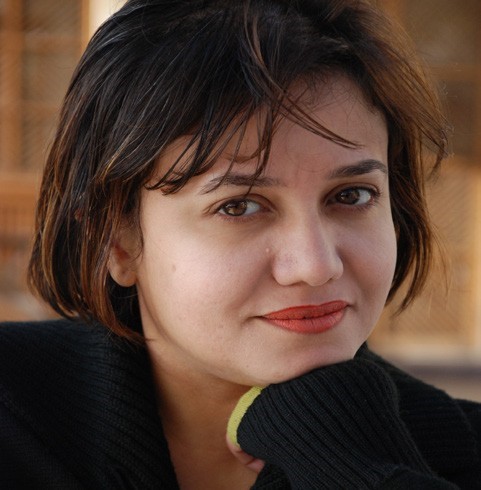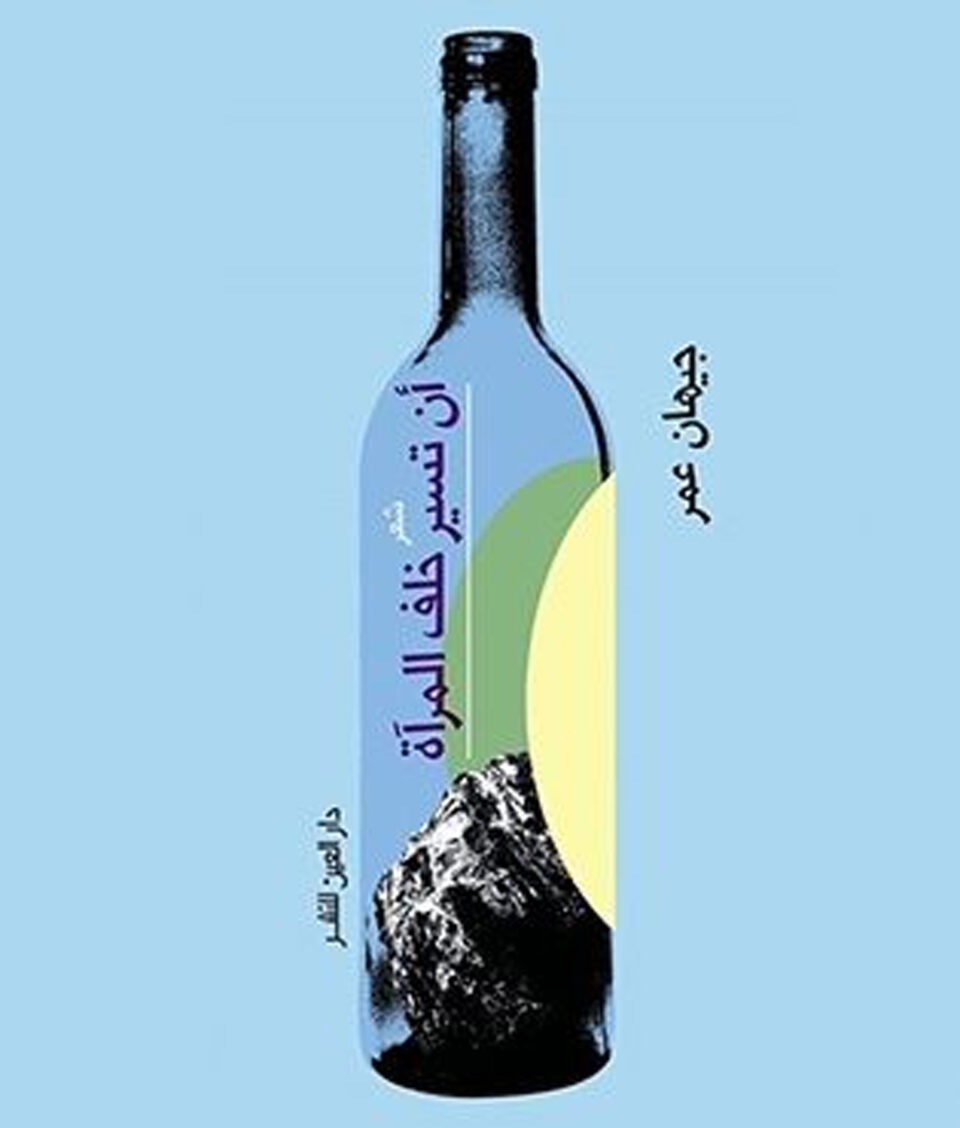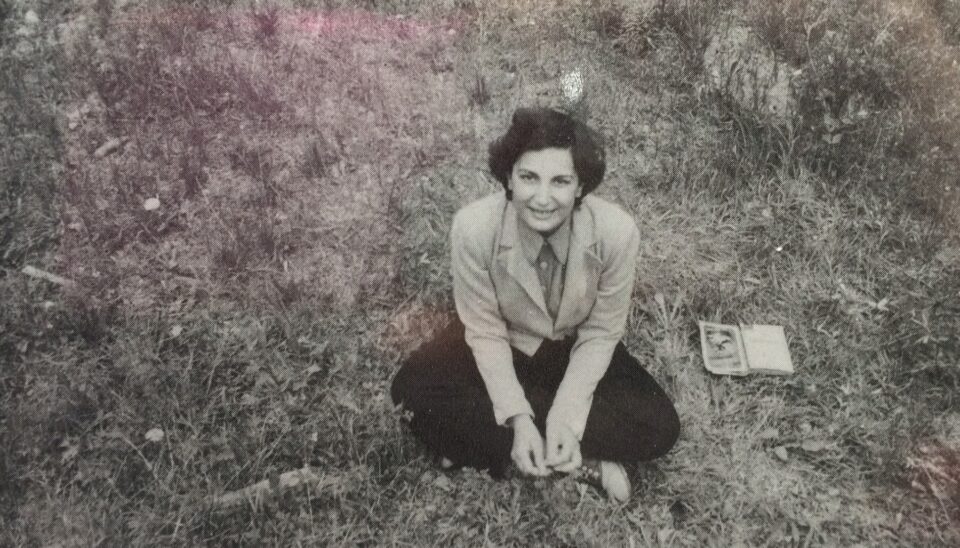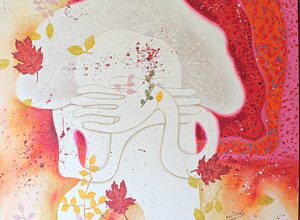I was asked to interview Gihan Omar, a young Egyptian poet. She insists she is not young anymore, yet I couldn’t help but notice her youthful spirit and maturity that mingle together creating simplicity.
So, excited and eager, I started preparing. I was surprised to find myself writing spontaneously after reading about her for a while. I was inspired by her poems, inspired by her uncomplicated philosophy that reveals how deep a single moment could be. Omar studied philosophy at Cairo University and has published three books of poetry, Light Footsteps in 2005, Before We Hate Paulo Coelho in 2007, and finally Walking Behind the Mirror in 2013. Some of her poems are translated into English, French, German, Korean, and Bosnian. She has also participated in several poetry festivals in Lebanon, Damascus, France, Sarajevo, and Korea. Currently, she practices photography and writes for various magazines. Knowing more about her story, and the incident where she lost her love—which journalists and critics highlight insistently—I started to have questions about her ideas and symbols, how she captures time so easily and turns it into little, simple words that say so much.
Which writers have inspired you?
There are many: Kundera as a novel writer inspires me intensely. Philosophical writings always inspire me, especially those of Friedrich Nietzsche. The thing that least inspires me is poetry! But I love some Egyptian poets, such as Eman Mersal, Abd El Monem Rashdan, Mohamed Soliman, and also some young poets who have a new style and creative ideas. From old poets, I love El Motanaby, Wadeea Saada, and Onsy El Haag from Lebanon.
You said once, “I love things that happen in a glimpse, and that’s how I like my poems to be; I can happily end a poem without even mentioning what it wants to say.”
Do you think that poetry is about the writer expressing an experience, without putting the reader in mind?
Not really. Here I was explaining why I don’t write narratively, as I love to focus on a specific scene, a moment, because this is how I now see life. Before, life to me was this long chain of successive events and experiences related to each other, but it’s not like that anymore. Every scene is an experience of itself that could easily eliminate the moment before. As for not mentioning what I want to say, I meant a specific poem called Daily Activities where I was talking about all the contradictions I do within one day, and I finished it without an ending because this how my days are sometimes, they don’t have a complete ending. But I do care about conveying my message to the readers, even when I feel unable to convey a specific meaning, I would love for the reader to feel this between the lines and understand it. It’s better sometimes to leave things with an open end.
You once said, “I fear writing, because I see myself in what I write, then others see me through these words.” How do you overcome this fear?
This happened to me when I was young; I used to hide my writings. Sometimes it still happens now that I don’t write, but not because of fear. I simply resist my feelings to write because I feel that my thoughts are normal and repeated, or because I am lazy, but when the thought insists, I let it out on paper. I don’t usually write every day for hours; I could go months without writing, because I think writing is really about living your life, not writing it. I could be going through an experience but never write about it till it ends and becomes a memory; it’s not a matter of being prompt. Actually, I love to keep my feelings inside me till they become old, and it takes an effort to get them out. Also when it becomes a memory, imagination can enrich it and I don’t regret letting an idea go without writing it, if it fades then it wasn’t original. Valery describes ‘ideas’ as letters coming from heaven, so I was asked once what I do with these letters and I said, “I tear them apart.” Sometimes I avoid ideas and beg them to let me be in peace, but my last book was an exception, I used to write every day and ideas were flowing, I couldn’t control it.
You once mentioned that it’s annoying how people understand literature within the personal life experience of the writer, but then what else inspires a writer other than his/her own life?
Inspiration doesn’t have to be from a direct personal experience, it could be someone else’s experience, or an artistic experience like a movie, a beautiful painting or a melody. But it’s my writing technique, as I always write in first person, so people relate it to me. Which isn’t always true. Literature also includes imagination, but unfortunately in Egypt—especially if a woman is writing—her writings are always thought reflect her own personal life.
Your poems are like short stories of moments that might be hard for anyone to capture or appreciate, and you give an amount of detail for such a short moment that makes it alive and rich. Can you talk more about this process on how you write?
What always possesses me is the idea, and I start writing it without knowing how it will end. It comes out very spontaneous and I leave it fresh, the way it first came out, even if the sequence is strange. This is what would make it different from other writings, as it reflects my real “self,” without trying to imitate others or be “logical.”
Some critics label your writings as “daily life writing or the poetry of details.” When you write, do you think about the kind or genre of writing, or do you let your words flow freely?
No one can write while thinking about what critics say or how they categorize their writing. It should be just what’s inside you, with your pen and paper. About the details, we write about our lives sometimes, and when I am subjected to a cause, I express it through describing details. I don’t like abstract intellectual writings, even if I am talking about something very deep, I can manifest it through this cup of coffee or anything tangible. I like merging what’s physical and daily with intangible, philosophical meanings.
As someone who thinks and writes a lot about death, loneliness, and sadness, why do they dominate your themes and what do you think about opposite meanings like life, happiness, and hope?
Actually these themes dominate my last book specifically, because it expresses a phase of loneliness and the experience of losing someone. My previous poetry might have had some deepness within, but it wasn’t about death and loneliness. On the contrary, I always support the idea of life and hope even within my writings about death, because I don’t perceive death as an end. I don’t write about it with despair, it is simply an experience we go through and life goes on. I deal with it as a philosophical idea: for example, a woman who lost her lover would enjoy this book, even if he wasn’t dead, because losing someone is one kind of death. Anyone feeling lonely, even if it was for a moment while drinking coffee, would strongly feel and enjoy this book, because it handles loss and death from a wide perspective. At the end, I relate every detail about death to life, as I prefer remaining within a “life” scene.
Apart from the themes in your work, what motifs or symbols do you feel you repeat (if any)?
For a while, I was obsessed with the word “little.” I found myself writing it excessively! “The little table”, “The little glass”, so I started to cancel it because it weakened the text, unless it was needed. But I don’t repeat certain symbols or motifs. I hate repetitions, and I believe if a writer likes a word or a symbol, they should always try to control it and resist repeating it.
Are you aware of any of your themes or motifs/symbols that have changed as time has passed, and did you feel that shift occur within, or did it become evident to you through seeing it reflected in the work?
Change happens as time passes, but I don’t always feel that shift or change occurring. I can’t capture it happening, because it happens in separate phases and it’s internal, so I see the change in my thoughts and feelings through my writings.
In terms of circumstance and environment for writing – do you believe in the idea of perfect? And if so, what would it be?
No, I don’t like the idea of perfect [perfection], I believe it’s against art. Writing should be good, not perfect. I even resist perfection in my normal life as it takes from the beauty of spontaneity.
As a writer, what makes you unable to write and how do you deal with that? Did you ever have a time when you “had to” write?
I was unable to write when I postponed publishing my latest book. I even thought I had forgotten how to write.
When I published it, I felt liberated. When you keep something unpublished, it creates a block between you and the new experience, because it remains incomplete. After publishing, I had ideas flowing. Sometimes I have to write an article requested by a paper, or because I committed to a deadline during a workshop. But I can’t be asked to write a poem; poetry is the result of inspiration.
If we consider every book you published as an experience of its own, which one did you enjoy the most?
My first book Light Footsteps is a collection of poems I wrote during a long period. Some of them go back to university. It includes many themes and different emotions, and I cherish it especially because it was the start of realizing my own feelings, during adolescence, when I started to meditate and think about life. It was more about the details of my life, as it’s my habit to scrutinize every detail around me, even if they are not directly related to me, and then it all magically turns into poetry; I see everything as poetry. My latest book was different, as it is more mature, more variable and daring.
Through some of your poems, and even your Facebook statuses, you write about yourself twice within the same context but in different positions, for example: “I open my window in the morning, hoping I will see me there.” Where does that come from?
It is just that sometimes writers feel like they have many selves. People say casually, “I can’t find myself.” I don’t believe we have only one self, surely life is richer than that and we can do other stuff with those other selves. You could be talking with someone, meanwhile you are thinking about something totally different. The good thing is to keep a good relationship between those different selves within you! A poem in my last book says: “I was banished by myself in the middle of the night after the battle raged between us.” This internal battle reflects the artist within, but even when it is positive, it can still turn serious or unhealthy sometimes. Like Salah Jaheen for example, he used to turn from extreme happiness to extreme depression for no clear reasons.
A verse in one of your poems says, “be confident and patient when you meet God.” Can you tell me more about this verse?
This poem is ironic. It is called Prompting. As you know, when someone is dying, during his last moments people prompt him to recite the Shehada, or forgive someone, or announce a will and so on. My idea was that it’s my right to tell my husband what to say and what not to say, especially since he’s someone close to me. This idea of playing and imagining new meanings about death is what makes it bearable, as I don’t like to focus on the dark side. It says:
“Don’t tell him that I used to eat the last plate of creme caramel.
Tell him that life was beautiful.
That you are grateful for this short experience
That the ending wasn’t tragic
And that the screams of your wife on your ethereal body
Were mere vibrations hanging in the air.”
So here I was just trying to ease the tragedy of the situation. Because even if life were to be cut short suddenly, that doesn’t mean it is incomplete, it is relative. I said, “be confident when you meet God,” because when someone is about to meet someone important he would be nervous, so I was just telling him what to do, even though I know it’s ironic and strange. But that’s the beauty of poetry; you can say anything even if it sounds illogical.
What is your favorite poem, from your own writings?
I love the poem I wrote as an introduction in the latest book, because it reflected exactly my status and what I wanted to say, I also like Light Footsteps, as it’s very special to me.
What do you think of the creative, intellectual status of our society?
After the revolution, many writers were published, but I believe that better writings will emerge in the future. Many people halted reading or writing, including me. However, the positive impact was that it encouraged young writers to be brave enough to publish and say what they want, even if their product is immature; it’s enough that they broke the barrier. And there are many different new ideas and writing styles in the current generation.
“I don’t believe we have only one self, for surely life is richer than that.”
What do you feel for the city of Cairo and its place as a writer’s home?
With all the chaos in Cairo, I believe it holds some kind of magic that inspires me. I even miss it when I travel. However, in the past, the artistic movement was richer; if a book was published or discussed in Cairo it would echo to the rest of the Arab world. I feel that Egyptian writers who live outside of Cairo are unlucky, as they rarely get a chance for their work to be published or known; they are buried even though they make a lot of effort. Some writers in other cities are more talented, but we know nothing about them. We keep celebrating and promoting Cairo writers, but meanwhile we should be appreciating good writers from other cities.
What would be your advice to someone who is trying to be a poet?
Reading is the most important thing, and to live life deeply. To live in the moment with all it’s dimensions and to meditate, and take in every detail to the memory. Details like the taste of something, the sound of this music, and to shape their own moments and live them intensely. To understand themselves, and always ask “Why do I feel that way?” And being open to all kinds of arts. The process of writing could be demanding, but this effort or pain is nothing compared to one’s happiness after an achievement.
What is the feeling that dominates your life right now?
I still enjoy the euphoria of publishing a book and seeing it come to light. Reading what critics write about it and getting messages from readers just makes me really happy.
What work can we next expect from you?
In the future, I want to try narrative writing and experience something other than poetry. I want to write about my trip to Korea in 2009.








